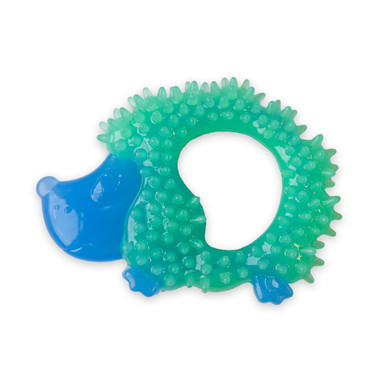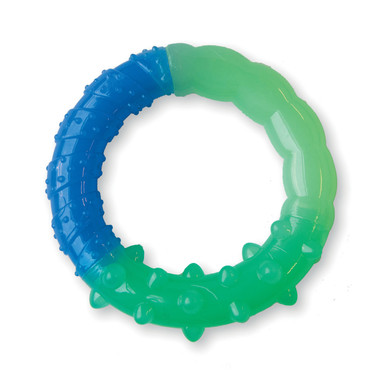Your dog is expecting puppies. Or, perhaps, you’re going to get a puppy soon, and you want to know all about puppy development. You’re wondering: When do a newborn puppy’s eyes open?
By finding out about a puppy’s eyes and other information about the early stage of a dog’s life, you can be prepared to take care of your new puppies and be the best pet parent possible.
When Puppies Open Their Eyes

Newborn puppies usually open their eyes for the first time when they are 10 or 14 days of age. This is the amount of time it takes for a puppy’s optical nerves to fully develop.
Before they open their eyes, a newborn puppy is very sensitive to light, especially bright light. You should keep your puppy somewhere that’s not brightly lit so that you don’t irritate his eyes.
Puppies don’t really need to see anything before about two weeks of age because they can smell the mother dog and drink her milk. A dog’s sense of smell is the strongest sense and continues to be the strongest sense even after it opens its eyes.
During this early stage, dog owners need to make sure puppies are in a safe space with their mother and littermates.
How Breeds Differ When Opening Their Eyes

Dogs of different breeds will open their eyes sooner than others. For example, some dog breeds that will take 10 to 14 days are golden retrievers, cocker spaniels, and German shepherds. On the other hand, fox terrier puppies may take a full 21 days to open up their eyes. It all depends on the breed’s schedule for eye development.
Keep in mind that littermates may not open their eyes at the same time either. If one puppy is opening his eyes and another isn’t, this usually isn’t a cause for concern unless there are signs of an illness.
What Is a Puppy’s Eyesight Like?
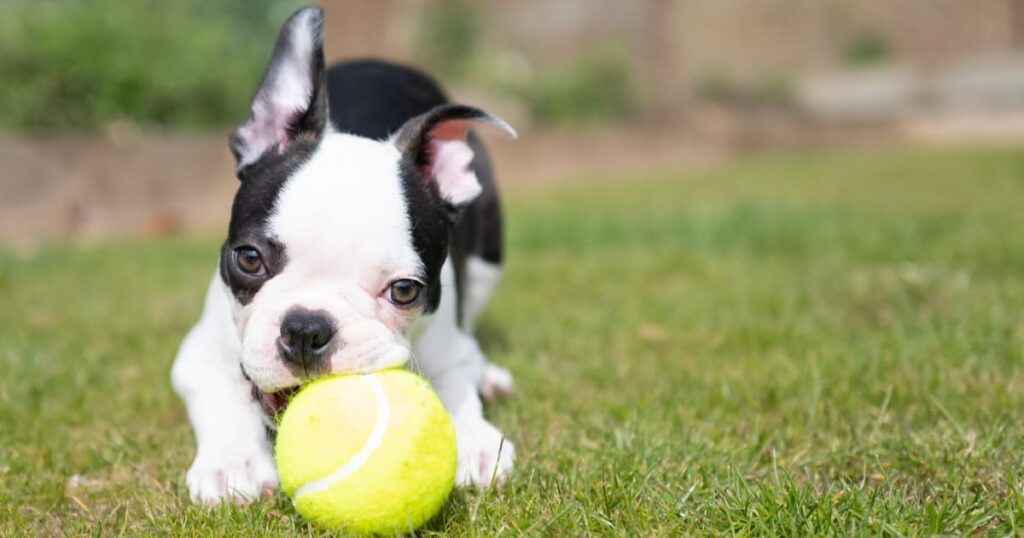
Puppies don’t see perfectly in the first few weeks of life. Your dog’s eyes may partially open for many hours or up to 24 hours before his puppy eyelids are fully open. Your puppy’s vision will be a gray haze before he can start to focus.
While puppy development is still happening, you should keep your pup in a protected environment where he can’t access anything that could hurt him. You should be aware of where you’re walking when you’re near your puppy because he may not be able to see you. It’s always good to speak in a soft and calming tone as well so that you don’t scare him.
Usually, the mother will take care of a pup‘s eyes. But if the mother is not around, then you can take a damp cotton ball or cloth and gently wipe away the discharge from your puppy’s eyes.
You can also use a cotton ball to test your puppy’s eyesight. You can toss one into the air and see if your puppy reacts to it. If your puppy follows your hand and the ball in the air, then he can see.
What If Your Puppy Isn’t Opening His Eyes?
Your puppy may not be opening his eyes within the 10 to 14-day time period, or perhaps the longer period depending on his breed. It’s best to be in touch with a veterinarian as soon as you realize your mother dog is pregnant or you get your puppy. There could be issues with your puppy’s optical nerves, and your vet will need to take a look.
If there is discharge or pus coming out of the eye, your puppy may have an eye infection. You should be especially careful and take your puppy to the veterinarian ASAP if he’s having trouble eating and going to the bathroom, too, because this could mean that he’s sick.
Puppy Development Stages: When Do You Get a Dog From a Breeder?
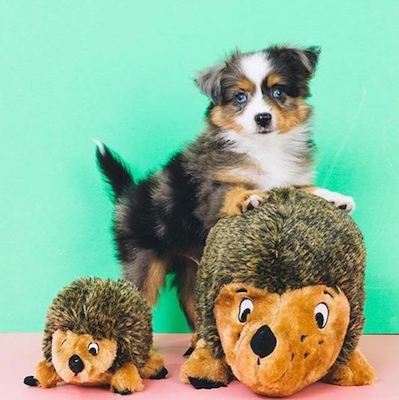
If you aren’t breeding your puppies, you may be purchasing one from a breeder. A reputable breeder won’t sell you a puppy before he hits eight weeks of age. This is because weaning may take that long. A
t three to four weeks of age, a puppy will begin switching over to puppy food, but it can take several more weeks for him to fully be able to eat dog food and not need his mother’s milk anymore.
Even if he is weaned early, it’s good for him to stay with his mother until he hits the two-month mark so that he can bond with her. If a breeder is willing to sell you a puppy that’s younger than eight weeks of age, they are likely not reputable and you should stay away.
There are two exceptions when it comes to getting a younger puppy. You may have found some puppies that lost their mother dog, or you might be rescuing a puppy in need. In those cases, you have no choice.
Make sure that when you get your puppy from a breeder that the parents have passed the Companion Animal Eye Registry (CAER) examination. This means that they don’t have any eye disease. Some dog breeds that are prone to genetic eye issues include Irish setters, pit bulls, Labradors, American bulldogs, French Bulldogs, and Australian shepherds.
Caring for Your Newborn Puppy
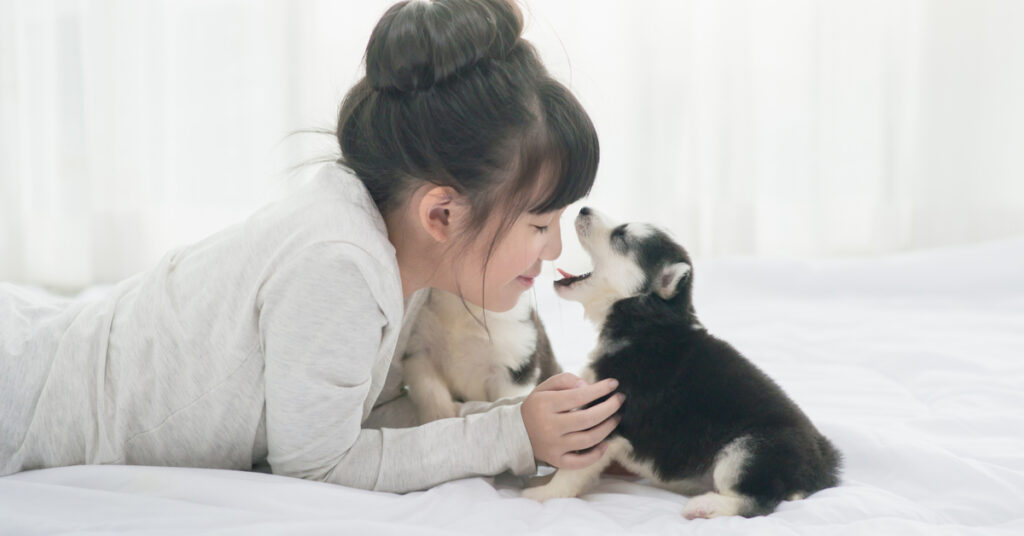
You should get veterinary care for your puppy as soon as he’s born or as soon as you receive him from the breeder. Then, you can make sure he’s staying on his vaccination schedule and you’re properly transitioning him to solid food, training him, teaching him how to go to the bathroom outside, and socializing him.
Your vet may give your pup eye supplements to aid in healthy eye development. If you want to buy supplements in the store or online, ask your vet first which ones they recommend.
Playtime is an important part of a dog’s life at any age, whether he’s a puppy, adult dog, or senior dog. You can get toys specifically designed for puppies to keep your pup occupied and ensure he gets the exercise he needs every day.
Puppies begin teething at about three weeks of age, so invest in some sturdy teething toys he’ll be sure to enjoy. Outward Hound has some great options, including the Orka Grow-With-Me-Ring Dog Chew Toy, which has three different types of textures to provide teething relief as well as curb puppies’ destructive behavior as those baby teeth come out. It will massage your dog’s gums as he chews and exercise his jaw muscles at the same time.
You can also try the Cutie Chewies Hedgehog Dog Chew Toy, which is for puppies and small dogs. It will also massage your dog’s gums and clean off soft plaque so that he has healthy teeth.
Cutie Chewies Hedgehog Dog Chew Toy, Blue
$5.99 $3.99
The Petstages Cutie Chewies Hedgehog is the ideal chewing toy for your puppy or small dog! Made with durable and flexible Orka TPE material to satisfy your dog’s chewing urges and raised textures to support good dental hygiene. This adorable chew toy can bounce and float so you can play all types of games with your pup no matter where you are!SMALL PUP CHEW TOY: Petstage’s Cutie Chewies Hedgehog is made…
Orka Grow-With-Me-Ring Dog Chew Toy, Multi
$6.99 $7.99
Petstages Grow-With-Me Ring is the ideal chewing toy for your growing puppy! Made with Orka TPE material that is durable, yet gentle enough on teeth and gums. This chew toy satisfies your pup’s instinctual needs to gnaw and bite as they go through the teething process with three types of textures. Feel free to toss this multi-colored chew toy around at the park or pool because it’s both buoyant and…
Tracking Puppy Development
Bringing a new puppy into your home is exciting. If you track his development with the help of your veterinarian, you can make sure he is a healthy – as well as a happy – pup.
